Russia Ups It’s Relative Power in the Syrian Crisis
On September 27th, a New York Times article by Michael Gordon revealed a surprise agreement between Russia, Iran, Syria, and Iraq in which the states have agreed to share intelligence about the Islamic State. It is important to note that this deal was apparently established without the knowledge of the United States, as Russia and the US differ greatly in their approach to the conflict in Syria. To put this difference simply, Russian leaders support Syrian President Bashar al-Assad’s government while the United States remains wary of the legitimacy and efficacy of his leadership.
Independent of the situation in Syria, the alignment of such powerful states as Russia and Iraq in a coalition that excludes the United States could be perceived as a dangerous balance of power, especially in the wake of Russia’s aggressive annexation of Crimea. Putin’s lack of regard for international institutions such as the United Nations, which deemed the action unlawful and called for a peaceful resolution between the two countries, is strong evidence against an optimistic, liberal outlook on current international politics.
Looking at the situation from a realist perspective, as Russia has given us cause to do, an escalation seems likely. Russia and the remainder of the members of the coalition together form what could be an incredibly powerful adversary (realist theory requires that states assume that other states have this potential). Should the events unfold as Russia appears to intend -with influence over the selection of the next president of Syria and lingering ties with Iraq and Iran- the US aught to be fearful.
